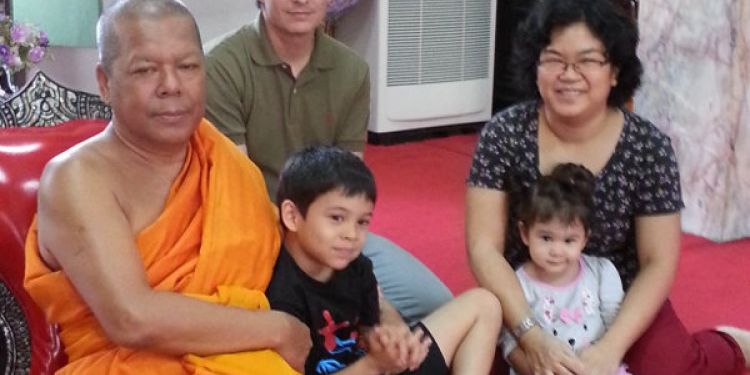Where are you from, John, and what are you doing nowadays?
I'm an American expat living in Bangkok, here for 8 years now, working in IT. How this relates to what I did before is a long story. I was trained and worked as an Industrial Engineer previously, which relates to this current work (a data center environment involves complex systems beyond IT equipment). I lived in Hawaii prior to here, in graduate school in UH there, where I met my wife, a fellow Thai student, and we moved here after.
Why did you choose to expatriate to Thailand?
We had problems with a visa for my wife due to a knowledge-exchange scholarship clause (she was part of an East-West Center US State Department program). We can return now as the eligibility exclusion for the visa is expired, but we have a life set up here now.
As a US national, what where the procedures you had to follow to move there?
Anyone can visit Thailand without a visa, and get a tourist visa on arrival, so the difficulty in staying in Thailand relates to getting a longer term visa and work permit. Initially, I used a spouse visa and later started work and switched to a work related visa. The paperwork that Thai companies do to hire and retain a foreigner working for them is substantial, and there is considerable expense, and some restrictions. So although it's not uncommon for expats to do different types of work, opportunities are limited.

What has attracted you to Bangkok?
My wife is from Bangkok, and it has the most opportunities for work in Thailand (although Chiang Mai isn't so different). It has a lot to offer beyond that: cultural activities, restaurants, parks, lots to see and do.
What has surprised you the most at your arrival?
When I first arrived, I thought the heat must have just been a temporary circumstance, that I arrived at a hotter time. But I later found out that it was really the rainy season, and not hot just then. The look and feel of Bangkok was a little shocking at first, and the smells, all so foreign. I always wondered if we might be in "the bad area" in Bangkok since they build huge, modern malls and put office buildings up right next to shacks or industrial zones (there is no formal zoning), but I was later pleasantly surprised to find out that Bangkok is a very safe city. It seems safer to me than the other larger cities I've lived in back in the US (Dallas and Baltimore).
Was it difficult to find accommodation there? What are the types of accommodation which are available there?
We live in a large house which is owned by my wife's mother, so we never faced that challenge. It's more normal for families to live together in the Thai culture, something I thought I couldn't deal with at first. But now, I can't imagine raising our kids without her help and one more person supporting them. There are lots of different types of housing here (houses, apartments, condos), so as with work it relates to finding a balance that works with all of someone's individual circumstances.
What are the local labor market's features? Is it easy for an expat to find a job there?
There is only one job expats typically do here: teach English. In the past, working in IT and other specialized professional jobs were more of an exception. Since Thai engineering staff-resources competency has become so developed, such fields are becoming more of a challenge for expats to be a part of. The easiest other way to work here is to be a part of a company that already has presence here and transfer (eg. We've had foreign family friends that worked at a major tire manufacturing company, although they were Chinese). One other possibility is to work with government agencies or NGO's, such as the United Nations, and there are other exceptions.
How do you find the Thai lifestyle?

I work in a modern work environment that shares a lot in common with US culture. We shop in a grocery store or go to a water park in the weekend, etc., but there are lots of minor cultural differences in perspective that took some adjustment. Put another way, to describe a "Thai lifestyle" as different than a Western lifestyle is almost not accurate, but there are differences.
Have you been able to adapt yourself to the country and to its society?
I'm adapted to the culture, although it would always feel a little foreign, to some degree. Language is a typical issue. I speak some Thai, but I'm not fluent in it, and I can't read Thai script based writing. One minor difference that describes some of the culture perspective difference is a Thai emphasis on "face" or image over being open and genuine.
In many cases, people are expected to say what is appropriate rather than what they actually think. This type of thing occurs in Western society as well, so it really relates to a matter of degree. I'm not an expert on other Asian cultures, but according to my experience this type of thing is even more pronounced in Japan, and perhaps similar but in a different form in South Korea.
Another interesting difference relates to class levels, which also occurs in American society, but again exhibited in a different way and to a very different degree. Foreigners fall outside the normal divisions, so learning how the role works in relation to other class roles took some time.
In many ways, foreigners are seen as on the higher side related to that scale, so there are more advantages than disadvantages to that "status," but it is odd experiencing such a pre-defined set of expectations.
What does your every day life look like in Bangkok?
Just like in most other countries. I commute to work, or go to a park, or a mall, a movie, or to the zoo, in the weekend. There is more presence of an older society here, older traditions, and I was ordained as a Thai Buddhist monk here for two months once (a very different lifestyle), but my ordinary days would seem very familiar to most.
Any particular experience in the country you would like to share with us?

It's not only related to Thai culture, but I've become very interested in tea since I've been here, and write a blog about the subject (Tea in the Ancient World, the title and inside joke about something my wife would say). They do grow tea in Thailand (lighter oolong, mostly), but to me this is a part of Asian culture everyone can experience more. Oddly, there is more online discussion related to discovery of better teas taking place in the US than here (although I am in Thai tea enthusiast groups on social media), and even China is moving towards coffee related to the preferences of many younger people. As far as more typical Thai experiences, we often go to beaches for vacation, not quite as nice as we experienced in Hawaii, but not completely different. I love local experiences here, participating in people living in different ways, like visiting old-style markets to shop.
What is your opinion on the cost of living in Bangkok? Is it easy for an expat to live there?
Cost of living and related issues for expats here becomes a complicated set of concerns. Thais live according to a broad range of standards of living, and there is a large Thai middle class, but how that general standard relates to expats isn't direct.
On the lower end, expats working as English teachers may earn a modest income of 30-50k baht per month (1,000-1,700 USD), although more compensation related to different types of positions is also not uncommon. This relates to a Thai middle-class income, even that of an experienced professional, but due to differing expectations this would support a modest lifestyle, according to what some expats would expect. Some examples will help clarify what I mean.
Typical apartment-style housing familiar in the West, in inner-city areas not far from most work, might cost 25k-30k per month. A more modest apartment further away might only cost 10k per month, still significant for the lowest https://www.expat.compensation level.
International school education per one child costs in the range of 600k to 1 million Thai baht per year, or 100% or over for the lowest level of https://www.expat.compensation.
On the "higher" end of the income and lifestyle scale, an expat living on a "package" might be compensated 250k to 300k per month (100k USD per year or more), which could relate to a very different lifestyle than that could provide in the US, for example enabling hiring a housekeeper and full-time driver.
How do you spend your leisure time?
I have children, so we spend our time at parks, at the zoo, playing at home, etc.
Your favorite local dishes?

I love the fruit in this country, not exactly a local dish but definitely local food (mangos, papaya, longan, mangosteen, lychee, and many more). Related to Thai food, I like local curries, red or green curry, or a Northern version of mild curry-based chicken noodle soup, Kao Soy, and green-mango papaya salad, som-tum.
What do you like the most about the country?
I like different aspects of Thailand, but one of the best is access to relatively local, regional travel, throughout Thailand or to interesting places like Cambodia, Vietnam, or Indonesia.
What do you miss the most about your home country?
I miss my family most back home. Related to culture, I miss the familiarity the most. I would always be a foreigner here, so although I am acclimated and adapted it only goes so far. Not being fluent in the local language is a difficulty and source of stress initially, one that lasted for years. But with even limited competency and shift in expectations later, it's not so much of an issue.
Would you like to give any advice to soon-to-be expatriates in Thailand?
For potential expatriates, I would advise getting out and experiencing a range of perspectives and local cultures here. It's possible for someone to live here and only see a limited range of people, perhaps even only mixing with expats, but Bangkok is diverse, with lots of completely different things to see and experience. I don't take that advise as well as I might since I get busy with a routine in raising young children, but children can do the same, see and do a range of things. My children are Thai, and also American, so both cultures and languages and a broad range of experiences are native to them.
What are your plans for the future?
I'm not sure when we will go back, so for now plans are to keep living a normal life, just here instead of in the country I'm from.

















Contact us to be featured in the Interviews section.
Participate